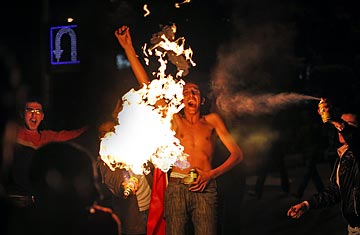
An Egyptian soccer fan ignites a canister of insect spray as he and others celebrate Egypt's 2-0 win over Algeria in the Mohandessin district of Cairo on Nov. 14, 2009
"Everyone is obsessed with soccer, and everyone loves it even if they don't play — like me, for example," says Sheikh Ali Abdel Ba'i, one of Egypt's state-appointed Muslim clerics, of the national pastime. "Football captures people's hearts. It's a game for the people."
That may be an understatement. You'd have thought Egypt had won a war on the night of Nov. 14, as thousands of Cairenes took to the streets of the capital bearing the national flag amid a pulsing, chaotic celebration of pounding drums, blaring car horns and exploding fireworks on sidewalks. Buses were commandeered, and mobs ran screaming through the streets. But the victory that was being celebrated was not from a war as much as a single battle: the home leg of the national soccer team's double header against Algeria, whose outcome will determine which country makes it to next year's World Cup in South Africa. Egypt's second goal, in the dying minutes of the game, had given the home team a 2-0 victory that put it neck and neck with its fiercest rival; the winner of Wednesday's rematch, to be played in neutral Sudan, will go on to South Africa.
Tensions had been simmering before Saturday's game. With the animosity approaching a feverish pitch ahead of Wednesday's playoff, all three African countries are bracing for violence. Wire services reported dozens of people injured in Egyptian-Algerian skirmishes following the game in Cairo. And on Monday, Algerian fans ransacked an Egypt Air office in Algiers, setting furniture on fire.
Meanwhile, the government in Khartoum faces the challenge of maintaining order among the many thousands of Algerian and Egyptian fans who are expected to pour into the Sudanese capital. Sudanese police are on high alert, and authorities say they have been careful to allot an equal number of seats to fans from both teams, leaving an additional 15% of the stadium's seats for Sudanese, so as to create a buffer zone. But even that might fail. Sudanese ticket holders could potentially sell to Egyptians and Algerians, and the coach of Sudan's national team told a British paper that he expected to see "massive security issues."
Although Egypt routinely wins the continent-wide African Nations Cup, it has not made it to the World Cup since 1990 (when it booked its passage with a win over Algeria). Being represented on the premier stage of the global game is no small feat for a country that is obsessed with both soccer and its national image. Nor have Egypt-Algeria encounters traditionally passed without incident: the 1989 qualifier was followed by riots in which an Egyptian team doctor lost an eye and Interpol issued an arrest warrant for an Algerian player.
This year's playoffs promised no less drama. A stone-throwing Egyptian mob attacked the Algerian team's bus after its arrival in Cairo last week, leaving three players injured. FIFA, the sport's world governing body, has called for heightened security, and the U.S. embassy warned its citizens to stay off the streets last Saturday. After the game, rows of Egyptian riot police armed with batons and shields lined the roadways leading into Cairo's central Tahrir Square, as chanting mobs flooded into the thoroughfare.
Even in a sport known to sometimes provoke extreme behavior among fans, the scene following Saturday night's win — and the tension building up to Wednesday's game — might seem a bit extreme. Some hint at a deeply rooted historical animosity between Egypt and Algeria, suggesting that a cold history between the two North African states could be partly to blame for the tension and violence. But the country's social frustration that is largely suppressed by its authoritarian government may also be finding expression in the soccer hysteria.
Algerians — whose country has been rocked by intermittent conflict for more than half a century, and whose government maintains a suffocating clampdown on the Islamist opposition — may have more in common with their Egyptian rivals than they want to admit.
In his 2008 book, Inside Egypt, John R. Bradley observes, "Egyptians are the most patriotic people in the Arab world." But, he adds, "I have never come across a local who does not despise his president to one degree or another." The police state that has kept Hosni Mubarak in power for three decades does not tolerate much expression of political opposition, and that may help explain why many Egyptians get more openly riled up for a soccer match than they do for a national election. Soccer provides an outlet for emotion, both positive and negative, that so many Egyptians so desperately crave, says Maher Gamel, manager of one of Cairo's most popular restaurants, al-Omda.
"The Egyptian people feel a lot of pressure every day. Life is difficult here. It is hard to find money, to make a living, and this is a hard thing to escape from," says Gamel, who packed 700 customers into every available inch of his restaurant on game night. "So football is a way to find joy, to escape from these pressures."
The escape from those pressures isn't always joyous. Downtown Cairo on Saturday night was one part circus, two parts anarchy; traffic lights lay toppled and blinking, and young people danced on buses.
"On Wednesday, we'll set up a big tent and 1,000 additional chairs," says Gamel. "It has been 20 years since Egypt played in the World Cup. It is the dream of 80 million Egyptians." Indeed, the emotions on Wednesday's playoff are likely to be even more intense than what was witnessed on Saturday — particularly if the result does not go Egypt's way.
